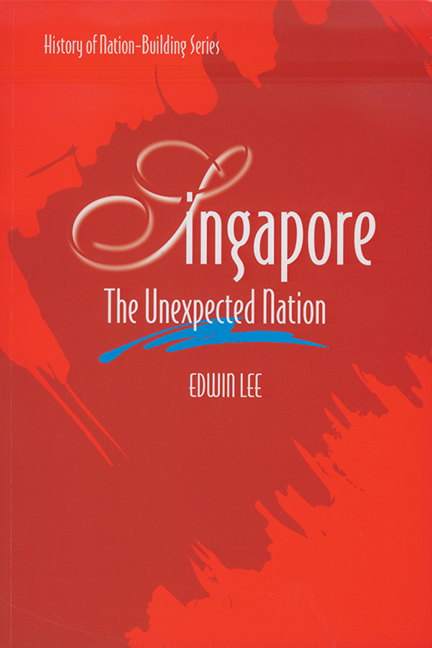Book contents
- Frontmatter
- Dedication
- Contents
- Preface
- Introduction by Wang Gungwu
- Chapter One Beginnings: From Temasek to Singapore
- Chapter Two Race, History and Nationalism
- Chapter Three Contestants and Contesting Visions
- Chapter Four The Accidental Chief Minister
- Chapter Five The Terminal Chief Minister
- Chapter Six The Embattled Prime Minister
- Chapter Seven Merger: Contesting Ownership and Principles
- Chapter Eight Terms of Disendearment
- Chapter Nine Dare to be Equal
- Chapter Ten The Way to Survive
- Chapter Eleven National Service: The Price of Independence
- Chapter Twelve Politics of Education
- Chapter Thirteen Home Ownership, National Stability and the New Middle Classes
- Chapter Fourteen University and Nation
- Chapter Fifteen Toh's Nation-Building Thrust
- Chapter Sixteen Nantah: Between Community and Nation
- Chapter Seventeen Self-Renewal: Talents for a Tough Act
- Chapter Eighteen The Consensual Prime Minister
- Chapter Nineteen Confucianism, Christianity, Chineseness
- Chapter Twenty Singapore Dreams, Singapore Dilemmas
- Chapter Twenty-One The Hyphenated Singaporean
- Chapter Twenty-Two The Unexpected Nation
- Bibliographical Note
- Index
- The Author
Chapter Fourteen - University and Nation
Published online by Cambridge University Press: 21 October 2015
- Frontmatter
- Dedication
- Contents
- Preface
- Introduction by Wang Gungwu
- Chapter One Beginnings: From Temasek to Singapore
- Chapter Two Race, History and Nationalism
- Chapter Three Contestants and Contesting Visions
- Chapter Four The Accidental Chief Minister
- Chapter Five The Terminal Chief Minister
- Chapter Six The Embattled Prime Minister
- Chapter Seven Merger: Contesting Ownership and Principles
- Chapter Eight Terms of Disendearment
- Chapter Nine Dare to be Equal
- Chapter Ten The Way to Survive
- Chapter Eleven National Service: The Price of Independence
- Chapter Twelve Politics of Education
- Chapter Thirteen Home Ownership, National Stability and the New Middle Classes
- Chapter Fourteen University and Nation
- Chapter Fifteen Toh's Nation-Building Thrust
- Chapter Sixteen Nantah: Between Community and Nation
- Chapter Seventeen Self-Renewal: Talents for a Tough Act
- Chapter Eighteen The Consensual Prime Minister
- Chapter Nineteen Confucianism, Christianity, Chineseness
- Chapter Twenty Singapore Dreams, Singapore Dilemmas
- Chapter Twenty-One The Hyphenated Singaporean
- Chapter Twenty-Two The Unexpected Nation
- Bibliographical Note
- Index
- The Author
Summary
Singapore had two universities, and their story epitomizes two different worlds of language, culture, and politics. The University of Singapore, opened in 1949, on the basis of pre-war colleges, was colonial-sponsored, and taught in the English medium. The staff consisted of a high proportion of expatriates, mostly British nationals during the colonial era, but more international thereafter. The graduates went on to jobs in the civil service, statutory boards, and the private sector comprising western banks and commercial houses.
Nanyang University was the unwanted child of the colonial era. It was born at a time of resurgent Chinese pride in their language and culture, inspired by Maoist China. Operational in 1956, Nanyang University offered monumental proof of how Chinese self-help could overcome British objections, but also of how the university could be turned into a symbol of the anti-colonial revolution.
Chief Minister Lim Yew Hock had the first crack at the Nanyang University problem, but his party was soon defeated in the May 1959 election. Then the task fell on Prime Minister Lee. In fact, Lee had two universities to think about, and two different types of problems. Nanyang University needed recognition for its degrees, and job outlets for its graduates. The degrees of the University of Singapore were recognized and jobs were ready-made for its graduates, but it was a colonial university which needed to be made relevant to the post-independent Singapore.
This chapter deals with Lee's ideas and actions on the remaking of the University of Singapore, occasioned by his encounters with the staff and students of this institution. Lee had often envisioned to himself and his cabinet colleagues the kind of university he would like to have. His envisioning should be understood in relation to the socio-political milieu of the emergent Afro-Asian world to which he belonged. He was at the younger end of the first generation of national leaders which included, in the order in which he named them, Jawaharlal Nehru, Mohamed Ali Jinnah, Don Senanayake, Tunku Abdul Rahman, Kwame Nkrumah, Jomo Kenyatta, Dr Hastings Banda, Julius Nyerere, and Milton Obote. “They have all been through universities”, he said, setting an example to their people of the efficacy of university education and inspiring them to emulate.
- Type
- Chapter
- Information
- SingaporeThe Unexpected Nation, pp. 359 - 386Publisher: ISEAS–Yusof Ishak InstitutePrint publication year: 2008

